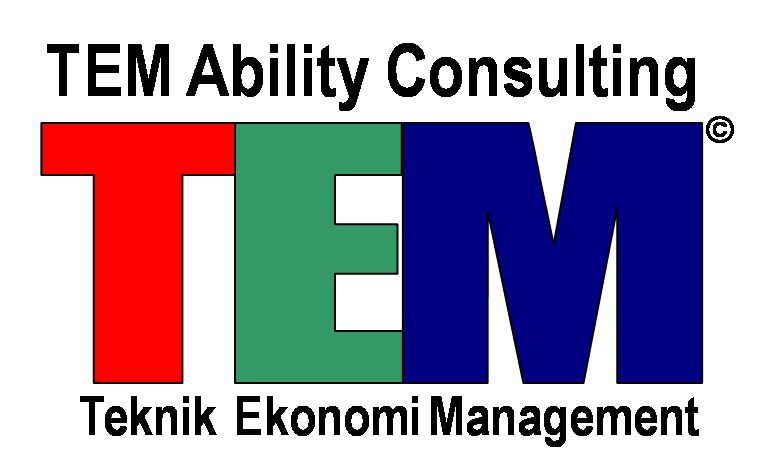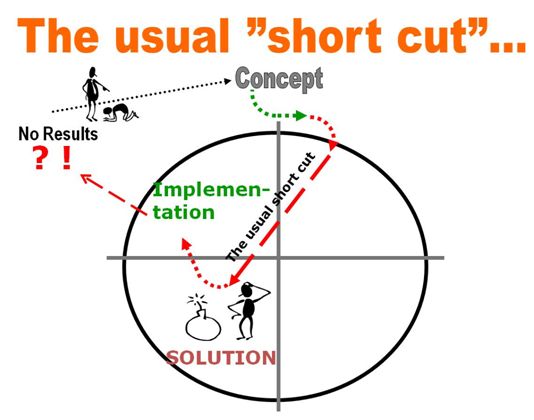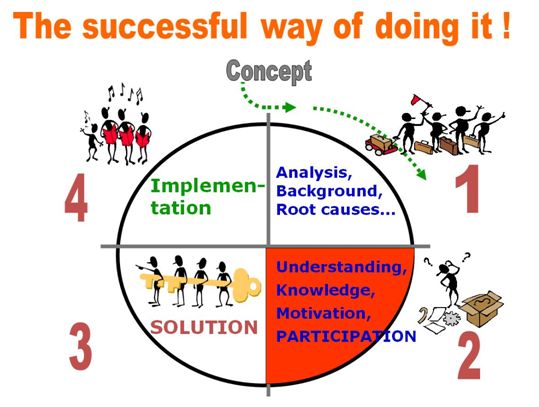|
MANAGEMENT

NO RESULTS.. ? CHANGE !

Happy Managers tend to take “a short cut” to “quick results” when they believe that they have found the solution (medicine) to the existing problem or “bottle neck”. The fact that they themselves can see the prospect of what the solution will bring is not enough. Those who are supposed to participate and most likely be the once to do it must also be part of the project. If not, most likely the project will be a failure in 10 out of 10 trials.
Employee Empowerment
At all levels, your company needs people who can deliver at the frontier of performance. They must understand where your company is going and be able to influence this path. They must share in your company's fortunes and be motivated to push for greater achievements...
Change Creates Opportunities
Change creates opportunities, but only for those who recognize and seize it. "Seeing is the first step, seizing the second, and continuously innovating is the third." Innovation redefines growth opportunities.
As current products are becoming obsolete faster than ever, in order to survive and prosper, organizations continually need to improve, innovate and modify their products and services. The Silicon Valley slogan "Eat lunch and you are lunch" is more than a reflection of increasingly intense work ethic. Riding the wave of change is becoming the most important part of the business. While the economy is shifting and innovation is rampant, "doing it the same way" is a recipe for corporate extinction.
LEADERSHIP
Managerial leadership
The purpose of assembling a team is to accomplish bigger goals than any that would be possible for the individual working alone. The aim and purpose of a team is to perform, get results and achieve victory in the workplace and marketplace. The very best managers are those who can gather together a group of individuals and mould them into a team.
Entrepreneurial Mindset
Venture values are different from established corporate shared values. "Entrepreneurial independence demands space for action and trust, while independence in a corporation implies responsibility and control imposed from above. Entrepreneurial speed demands agility, experimentation, adaptation, and rapid response in order to be first to market. Corporate experimentation comprises analysis, review, sober consideration of facts, and willingness sacrifice speed for thoroughness. Entrepreneurial paranoia - competitors are catching up to us - is overshadowed by an essential need to build corporate consensus and minimize perceived risk."
Breaking the Rules
So what separates extraordinary leaders from proponents of the status quo? They break the rules. Except, not in an arbitrary or capricious way. When you look at examples of extraordinary leadership, like Jack Welch of GE, certain practices or principles become apparent. To start, there is a declaration of what the future will be. There is also a purpose, something to stand for. And finally, there is a clearly articulated commitment...
Create an Inspiring Vision
Your vision statement should be short and inspiring. It must set a challenging and stretching goal that gives employees enormous freedom in finding ways to achieve it.
You have also to communicate the message that doing what you do now, only better, is not enough. If you do what you always did then you will not even get what you always got as you have to keep growing to stay where you are. "You have to do something different to get different results. You have to do something significantly smarter to get significantly better results."
Entrepreneurial Creativity
Entrepreneurial Creativity is about coming up with innovative ideas and turning them into value-creating profitable business activities.
Leading Innovation
Leading innovation is a delicate and challenging process. You need to encourage expansive out-of-the-box thinking to generate new ideas, but also filter through these ideas to decide which to commercialize.
Use a balanced "loose-tight" style of leadership for this purpose. "Loose-tight leadership alternates the creation of space for idea generation and free exploration with a deliberate tightening that selects and tests specific ideas for further investment and development."
EMPLOYEES, YOUR MOST IMPORTANT ASSETS
People as your most important asset. Your technologies, products and structures can be copied by competitors. No one, however, can match your highly charged, motivated people who care.
People are your firm's repository of knowledge and they are central to your company's competitive advantage. Well educated, coached, and highly motivated people are critical to the development and execution of strategies, especially in today's faster-paced, more perplexing world, where top management alone can no longer assure your firm's competitiveness.
MOTIVATION
Success comes through people. If you understand what motivates people, you have at your command the most powerful tool for dealing with them to get them achieve extraordinary results. "When companies are effective in satisfying their employees, employees stay longer, make a deeper commitment to the business, recommend ways to improve the company's products and services, and work harder to satisfy the customer. For the new manager who knows how to energize people and maintain their enthusiasm, the art of motivating is one of his or her success secrets. If you understand what motivates people, you have at your command the most powerful tool for dealing with them to get them achieve extraordinary results. "Motivation and power are so closely linked together that one can say there is power in a motivated person".
Motivation – One of the Most Important Management Tasks
Motivation is getting others to do something because they want to do it. To motivate others is one of the most important management tasks. It comprises the abilities to understand what drives people, to communicate, to involve, to challenge, to encourage, to set an example, to develop and coach, to obtain feedback, and to provide a just reward.
"Motivation is about cultivating your human capital. The challenge lies not it the work itself, but in you, the person who creates and manages the work environment."
How do you create motivation?
No doubt you have also had experiences where you just feel drained of energy and do not want to do anything about anything. You know, those days when everything just seems either pointless or overwhelming. It is during such times that you need to find that spark that will set you on fire and moving again .
Get started. The longer you delay in starting a project, the more likely it is that you will either not start it at all or you will not complete it. Action inspires more action. Just get started with the first step. The rest often falls in place once you decide to get moving.
Associate with the right people. Positive energy is more contagious than the flu. Just smile at a stranger and see what happens. Associating with the right people who are achievers and themselves motivated will help you to create motivation. Stay away from negative people.
MOTIVATION IN TERMS OF ATTITUDE:
Attitude Motivation Defined
Attitude motivation is about how people think and feel. "It is their self-confidence, their belief in themselves, their attitude to life – be it positive or negative. It is how they feel about the future and how they react to the past.
To become a motivational leader, you start with motivating yourself. You motivate yourself with a big vision, and as you move progressively toward its realization, you motivate and enthuse others to work with you to fulfill that vision...
MOTIVATION IN TERMS OF ENERGY:
The Power of Emotions
Financial rewards, such as performance bonuses and an equity stake in the financial results, do encourage people to conserve resources and produce results. But the kind of ownership that really generates energy is not economic. It is emotional. It gives people a sense of responsibility and makes them feel that their actions make a difference. Great leaders generate a spirit of teamwork and create a mutual learning and coaching environment that gives people a sense that they are a valuable member of the team and create a feeling that "we are all in this together, and we will succeed of fail, based on the actions of each person.
MOTIVATION IN TERMS OF FINANCIAL REWARDS:
Why Reward Systems?
The only way employees will fulfill your dream is to share in the dream. Reward systems are the mechanisms that make this happen. "However, reward systems are much more than just bonus plans and stock options. While they often include both of these incentives, they can also include awards and other recognition, promotions, reassignment, non-monetary bonuses (e.g., vacations), or a simple thank-you. The journey is the reward,
You Get What You Reward
The greatest management principle is that the things that get rewarded get done. "You get more of the behavior you reward. You don't get what you hope for, wish for or beg for. You get what you reward.
When your employees do hit the target and meet a stretch standard you set for them, reward them immediately.
Never stall. By doing this, you help employees directly connect the reward with behavior and higher performance they've attained. Fail to reward the right behavior and you will most likely get the wrong results.
Successful Incentive Program
A successful incentive program will not only increase profits but can also raise morale and inspire staff loyalty. Your program should include all the three greatest incentives:
1. Empowering people to do the thing you enjoy doing
2. Recognition – in all its various forms
3. Money
|